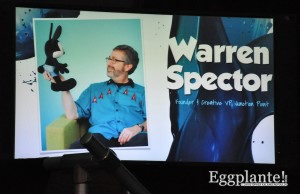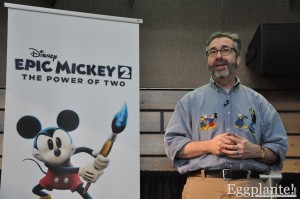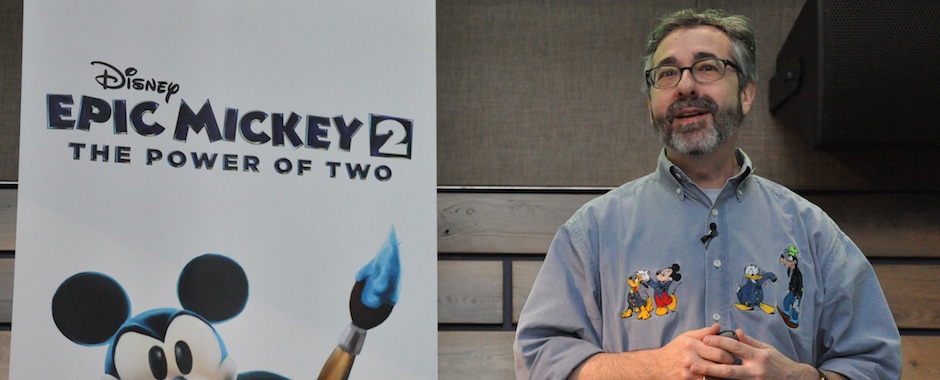 Earlier this week, Digifest 2012, Toronto’s Digital Media Festival, took place in the Corus Entertainment building downtown. Of course, there was a gaming component to the event, and we had the honour to sit down and chat with Warren Spector, designer, producer, and lead genius (we gave him that last title) of Disney Epic Mickey, in addition to tons of other properties like Deus Ex and quite a few entries in the Ultima series.
Earlier this week, Digifest 2012, Toronto’s Digital Media Festival, took place in the Corus Entertainment building downtown. Of course, there was a gaming component to the event, and we had the honour to sit down and chat with Warren Spector, designer, producer, and lead genius (we gave him that last title) of Disney Epic Mickey, in addition to tons of other properties like Deus Ex and quite a few entries in the Ultima series.
But one thing struck us about Warren as he gave a presentation on his latest game, Disney Epic Mickey 2: The Power of Two. Where most presentations about games highlight features for the sake of the press in the room to report back and hype up the game, the entirety of Warren’s presentation was how to make a great game and why he loved what he did so much. He literally made the audience ooh and ahh at moments, and he just exudes passion for what he does.
Here’s what transpired when we sat down to talk.
Eggplante!: So let me preface my question. It’s completely clear that all you have for your games and what you do is passion. Usually game designers throw events like this and it’s all PR, PR, PR, PR, and all you did was talk about why you love the game you made and that’s what came across, and it’s so refreshing and so beautiful. Where does that come from?
Warren Spector: You know, it’s funny because I saw my mom the other day. She’s 91 years old, she lives in New York, and we were just talking about how she watches all of my videos and reads every single article about me. And she says “you haven’t changed since you were five years old.” I’ve been the luckiest guy in the world because I’ve always just done what I want to do the way I want to do it and gotten away with it. I’ve made the games I want to make, the way I want to make them. If I tell you I’m going to make a game in less than three years, I’m lying. If you think I’m going to hit a budget, you’re fooling yourself. Look at the games I’ve made. That’s what I do. If you don’t want that, tell me now and we’ll part ways and be friends.
E!: You’re kind of the living embodiment of the adage, “You don’t stop playing because you get old, you get old because you stop playing.”
WS: I’m like Peter Pan over here! I’m probably the oldest guy still making games! I mean, I turned 57 a week ago! It’s not like I’m proud of that because all it means is I survived, but you know the fact is, I still love this stuff, I still game, yeah!
E!: So with Disney Epic Mickey and Disney Epic Mickey 2, given your ties to Disney and the characters, how do you outdo yourself?
WS: You know, frankly, you’ll tell me if we did, but I have a very specific process I go through for every project. It’s not a question for me thinking how I’m going to outdo myself, it’s about having a road map. I have an outline with stories to tell with each character, even if those stories never get told, I know I have a bunch of stories I want to tell that would be fun for me to tell. I have three games worth of game mechanics and I knew I wanted to introduce this mechanic here and this mechanic here, for example. It’s not a question of outdoing myself, but rather asking the question, “What’s the thing in this game that no one on planet earth has ever seen or done in a game before? What is it?” Because I don’t care if it’s Disney Epic Mickey 57, there better be one thing that you go, “oh my God, I have no idea how to do that.”
E!: So it’s not so much about coming up with a solution as it is coming up with the best solution to that problem?
WS: No! It’s about failing half the time! Failure is a part of the process! I mean, you have no idea how many things I’ve killed because they weren’t working or how many games I’ve worked on where we said “we don’t know how to solve this problem, cut that feature.”
E!: So, about the game itself. There is a very unique art style to it that borders on cel-shaded, borders on 3D. It’s very colourful, very dark in some spots, and I think that’s Disney. You walk into Disneyland and it’s colour, colour, colour, and whimsy, fantasy, and craziness. Being the super-fan you are outside of working on these projects, how terrified were you of getting this game right?
WS: I was not at all frightened or worried, honestly. There are different words I would use. I felt honoured. The biggest media company in the world gives you their most important property, so to be entrusted with that, you certainly feel honoured. So as soon as you start talking to people about Mickey Mouse, you realize a couple of things. Neither one of us has ever met or will ever meet a human being who doesn’t know who that character is. You want to try something interesting? Do a Google image search for Mickey Mouse, and you’ll see that almost any combination of three circles is Mickey Mouse. And a four year old will identify it!
 E!: So you felt the responsibility for not screwing it up, then?
E!: So you felt the responsibility for not screwing it up, then?
WS: Responsibility is the word. Honour and responsibility, absolutely. When you realize that everyone knows what you’re doing and cares what you’re doing, you just don’t want to be the guy who screws with people’s childhood. The thing that gets me in trouble but keeps me sane is what I told Disney when I started: my only responsibility to you is to sell one more copy of this game than I need to for you or someone to fund my next game. That’s all I need to do. After that, I need to make myself happy, make my team feel proud of the work we do, do something that no one else in the world has seen, and that’s it.
E!: What is it about Disney and Pixar that fosters that mentality of creativity? That feeling to just keep doing what you want to do – not at the expense of others, obviously – and create what your heart wants you to create.
WS: I think it’s Walt. I think it’s the culture that that man brought into the company. I sort of modelled my life after Walt Disney and David O. Selznick and I never wanted or needed to be the guy who directed a movie or anything. But I wanted to work with incredibly talented artists and incredibly talented designers and herd them to getting to a goal that’s better than any of us could get to alone. And to not be afraid to take chances. Look at what Walt Disney did: First sound cartoon that made any impact. First feature length cartoon. First full colour cartoon. First stereo sound in a movie. First theme park! First Hollywood studio to get involved in television without worrying that television was going to destroy them. First robotics in every day life. I mean, every time he tried to do one of those things, someone said, “Are you crazy, Walt?” And he put his ass on the line and he did every single one of them. Because he believed it.
E!: So with this game, what is your biggest achievement or the biggest thing that you’ve taken away from it?
WS: I guess I’m most proud of creating characters that people care about. Oswald is a character that people really care about. And even if we’re just dipping our toes in the water of musical comedy, I’m really jazzed about the fact that people have responded so well to the songs in the game. See, everybody at Disney gets songs, but there’s still this fear that gamers won’t buy a game because there are songs in it. So the lie I’m telling Disney is, “if people respond badly to this, I won’t do any more music in this stuff.” But it really is a lie, because I’m gonna do it anyway.
E!: And what are they gonna say, no?
WS: You know, one way or another, there a bunch of people on the team who are right there with me on crazy ideas about how to turn songs into game mechanics and introduce music into games in ways that have nothing to do with beat matching or performance, and I just really want to mess with that stuff! I’m proud that we were able to do it and people are responding well to it.
E!: Well congratulations on the whole thing, it really looks fantastic and we wish you all the best with it!
We’ll have a review of Disney Epic Mickey 2:The Power of Two within the next few weeks, so stay tuned to Eggplante.com for more!

